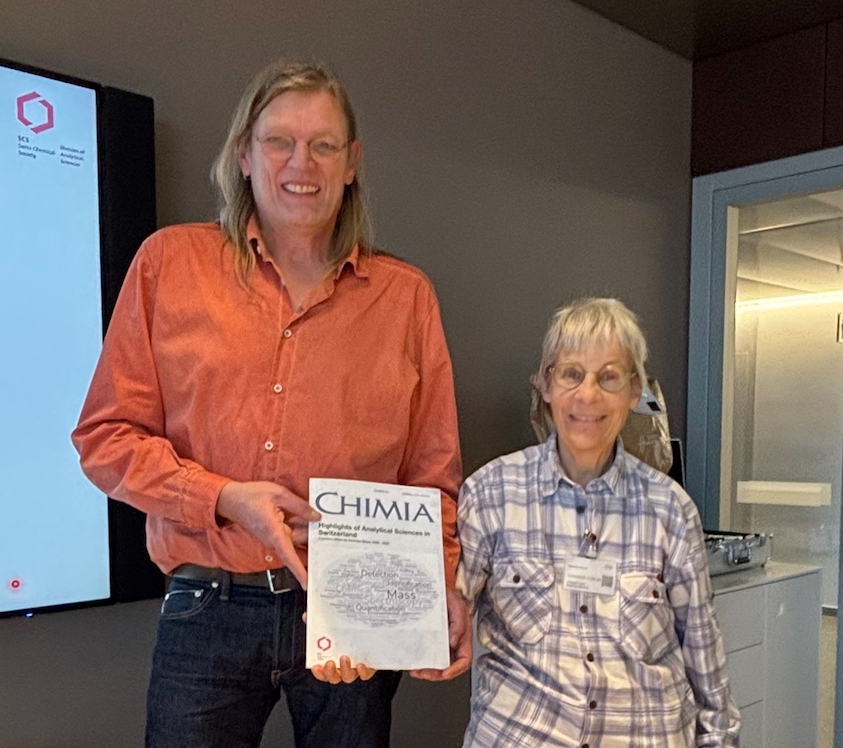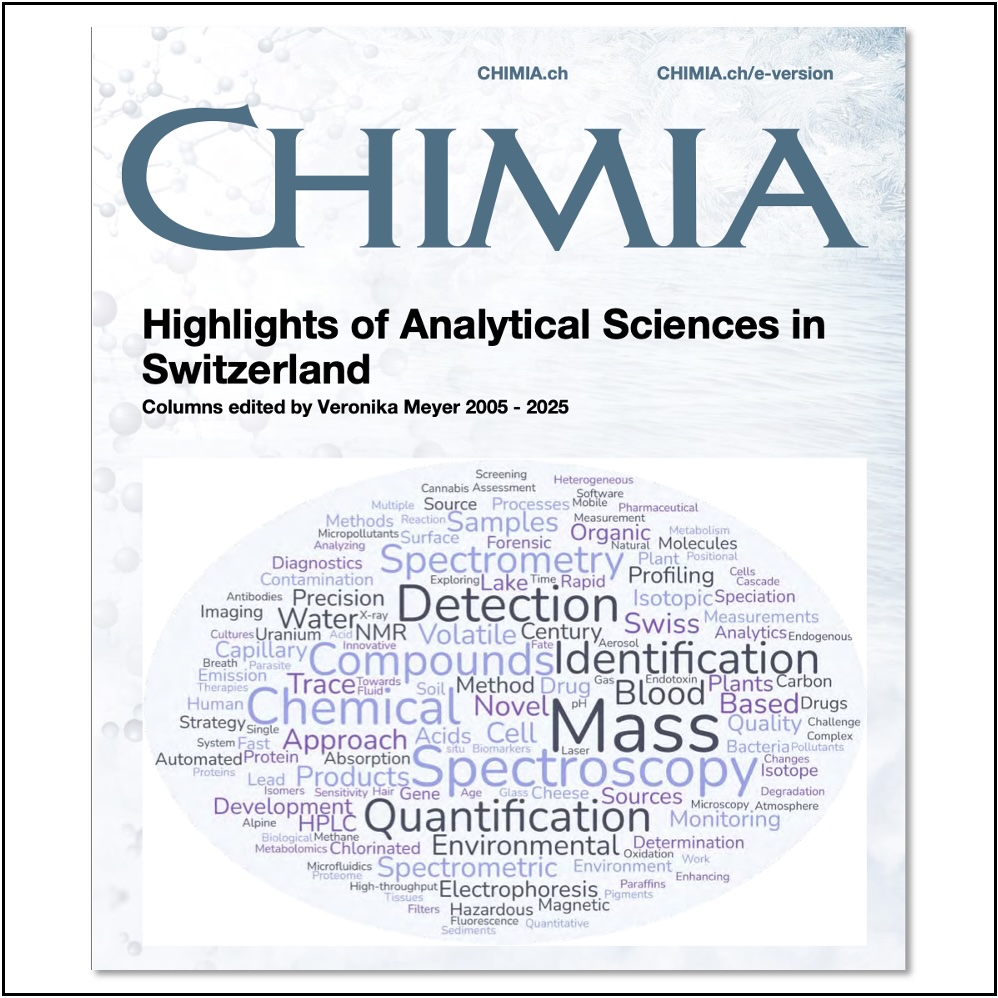
A Tribute to Veronika Meyer
 The CHIMIA column ‘Highlights of Analytical Sciences in Switzerland’ https://www.chimia.ch/chimia/catalog/category/analytical is one of the oldest and most consistently published columns to appear in CHIMIA. The columns are an undeniable success story, showcasing the excellent research that has been and is carried out in Switzerland in the field of analytical sciences.
The CHIMIA column ‘Highlights of Analytical Sciences in Switzerland’ https://www.chimia.ch/chimia/catalog/category/analytical is one of the oldest and most consistently published columns to appear in CHIMIA. The columns are an undeniable success story, showcasing the excellent research that has been and is carried out in Switzerland in the field of analytical sciences.
This is all entirely thanks to Veronika Meyer, who initiated the column (then called Highlights of Analytical Chemistry in Switzerland) in 2005 and who served as its editor for the past 20 years. As a passionate, recognized analytical chemist (honoured as IUPACs Distinguished Woman in Chemistry in 2017), author of a highly successful book ‘Practical High-Performance Liquid Chromatography’, and mountaineer (climbing Qomolangma), she has always sought new heights. She was able to identify and select important reports on cutting-edge research in the analytical sciences in Switzerland.
 After 200 columns, Veronika Meyer has now passed the editorship of the Highlights of Analytical Sciences in Switzerland column to Bodo Hattendorf https://doi.org/10.2533/chimia.2025.816.
After 200 columns, Veronika Meyer has now passed the editorship of the Highlights of Analytical Sciences in Switzerland column to Bodo Hattendorf https://doi.org/10.2533/chimia.2025.816.
In tribute to Veronika’s excellent efforts, the Editorial Board of CHIMIA has created a virtual issue of all the columns edited by her since 2005. https://www.chimia.ch/chimia/virtual_issue_analytical
Gillian Harvey, Chimia
11.12.2025
CHanalysis 2022, Beatenberg, May 19-20, 2022: Full Program available
The Division Analytical Sciences of the Swiss Chemical Society (SCG/DAS) is organizing CHanalysis, a meeting of Swiss analytical scientists. The full program is now available on cha22.scg.ch. Please register until May 5, 2022 for the event.
![]() Download the abstract booklet and get an overview of the outstanding presentations.
Download the abstract booklet and get an overview of the outstanding presentations.
The goal is to stimulate a stronger cooperation among persons working in different areas of analytical sciences. Scientists from applied and fundamental research, from industry, education, and regulation are welcome.
Invited Speakers
Lenny Winkel, Eawag
«Analytical Advancements Improve Insights into the Biogeochemical Cycle of Selenium»
Behnam Ahmadian Baghbaderani, Lonza
«Robust and reliable analytical methods: critical requirement for industrialization of cell and gene therapies»
Marco Baity Jesi, Eawag
«Machine learning as a tool to predict the toxicity of chemicals»
Detlef Günther, ETH Zürich
«Between Fundamentals and Applications – the Important Role of Analytical Chemistry»
Visit the website to see the full program: cha22.scg.ch
Important Date
- Registration: until May 5, 2022
More information
Website: cha22.scg.ch
Céline Wittwer, SCS
03.05.2022
CHanalysis 2022, Beatenberg, May 19-20, 2022: Abstract Submission Deadline extended until April 19, 2022
The Division Analytical Sciences of the Swiss Chemical Society (SCG/DAS) is organizing CHanalysis, a meeting of Swiss analytical scientists. We cordially invite you to participate in the next meeting in the Dorint Hotel in Beatenberg on May 19-20, 2022. The Deadline for abstract submission is extended until April 19, 2022. Regsiter here.
The goal is to stimulate a stronger cooperation among persons working in different areas of analytical sciences. Scientists from applied and fundamental research, from industry, education, and regulation are welcome.
Invited Speakers
Lenny Winkel, Eawag
«Analytical Advancements Improve Insights into the Biogeochemical Cycle of Selenium»
Behnam Ahmadian Baghbaderani, Lonza
«Robust and reliable analytical methods: critical requirement for industrialization of cell and gene therapies»
Marco Baity Jesi, Eawag
«Machine learning as a tool to predict the toxicity of chemicals»
Detlef Günther, ETH Zürich
«Between Fundamentals and Applications – the Important Role of Analytical Chemistry»
Visit the website to see the full program: cha22.scg.ch
Important Dates
- Submission of abstracts: by April 4, 2022 April 19, 2022
- Notification of acceptance: April 25, 2022
- Registration: until May 5, 2022
More information
Website: cha22.scg.ch
Céline Wittwer, SCS
01.04.2022
CHanalysis 2022, Beatenberg, May 19-20, 2022: registration is open
The Division Analytical Sciences of the Swiss Chemical Society (SCG/DAS) is organizing CHanalysis, a meeting of Swiss analytical scientists. We cordially invite you to participate in the next meeting in the Dorint Hotel in Beatenberg on May 19-20, 2022.
The goal is to stimulate a stronger cooperation among persons working in different areas of analytical sciences. Scientists from applied and fundamental research, from industry, education, and regulation are welcome.
Invited Speakers
Lenny Winkel, Eawag
«Analytical Advancements Improve Insights into the Biogeochemical Cycle of Selenium»
Behnam Ahmadian Baghbaderani, Lonza
«Robust and reliable analytical methods: critical requirement for industrialization of cell and gene therapies»
Marco Baity Jesi, Eawag
«Machine learning as a tool to predict the toxicity of chemicals»
Detlef Günther, ETH Zürich
«Between Fundamentals and Applications – the Important Role of Analytical Chemistry»
Visit the website to see the full program: cha22.scg.ch
Important Dates
- Submission of abstracts: by April 4, 2022
- Notification of acceptance: April 20, 2022
- Registration: until May 5, 2022
More information
Website: cha22.scg.ch
Céline Wittwer, SCS
03.02.2022
Neues DAS-Kursangebot 2021
Die Division Analytical Sciences (DAS) der Schweizerischen Chemischen Gesellschaft (SCS) bietet ein breites Spektrum an Weiterbildungskursen in den Bereichen der analytischen Wissenschaften wie Spezialtechniken, Methoden der Life Sciences, Qualitätssicherung, Spektroskopie und Trenntechnik an.
Vom Einsteiger bis zum Experten sind alle Anwenderebenen in unserer Zielgruppe. Wir bieten unsere Kurse in Zusammenarbeit mit Industriepartnern an, um die Anwendungsrelevanz zu gewährleisten.
Informieren Sie sich über das Kursangebot für das laufende Jahr 2021.
Céline Wittwer, SCS
11.03.2021
Page 244 of 305

